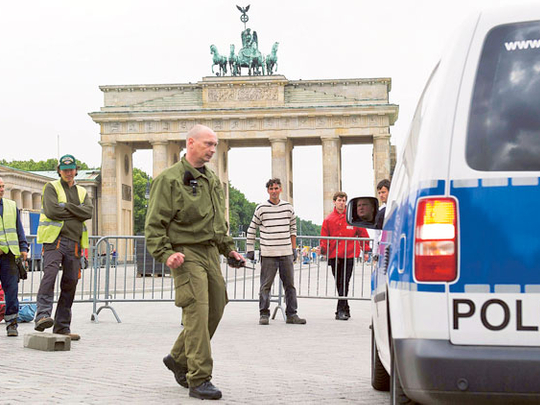
Berlin: Barack Obama will walk in John F. Kennedy’s footsteps this week on his first visit to Berlin as US president, but encounter a more powerful and sceptical Germany in talks on trade and secret surveillance practices.
Observers say Obama has cultivated an effective if “workmanlike” relationship with German Chancellor Angela Merkel, Europe’s most influential leader, mirroring a sobering of transatlantic ties since the fall of the Berlin Wall.
Obama, who dazzled a crowd of 200,000 people with an open-air speech in 2008 in the centre of the capital while still a candidate, will face more modest expectations this time round on his arrival late Tuesday for a 24-hour stay.
But he appears ready to try to harness some of the alliance’s bygone sparkle by timing his visit one week ahead of the 50th anniversary of Kennedy’s “Ich bin ein Berliner” speech.
That pledge of solidarity with the embattled Cold War city is still a reverential moment in the German national consciousness, and a touchstone on the country’s path back to the community of nations after the Nazi horrors.
Accompanied by his wife Michelle, Obama will hold another public address about the countries’ “enduring bonds” Wednesday, this time at the Brandenburg Gate, the symbol of German unity.
But the agenda for the talks, on the heels of a G8 summit in Northern Ireland, looks less than visionary, with slow progress on a EU-US trade pact to figure prominently.
Germany, however, is longing for reassurance that Europe still matters to the US since Obama’s much-heralded pivot to Asia.
Leading news magazine Der Spiegel last week featured a cover picture of Obama in Kennedy’s shadow, the tagline “The Lost Friend”, and an angst-ridden report about fraying ties.
“Kennedy’s visit to Berlin was an almost ecstatic celebration of a protective alliance,” it wrote.
But it said nearly 70 years after World War II and two decades after the end of European communism, “the trip of [JFK’s] no-less-charismatic successor will likely be a prosaic family gathering”.
The US has slashed troop levels in Germany to 73,000 from nearly 200,000 in the early 1990s and China has surged past Europe’s top economy as a market for US goods.
Commentators note that Germans, like other ardent Obama supporters, are frustrated by impasses on slowing climate change and closing the Guantanamo Bay lock-up.
Obama nevertheless enjoys a level of support here that even Merkel, Germany’s most popular post-war leader, could envy as she seeks a third term in September elections - nearly 90 per cent hoped he would be returned to office last November.
But now revelations of a global Internet snooping operation run by the National Security Agency have shocked a country where memories of systematic spying on citizens by communist East Germany’s despised Stasi are still raw.
Merkel’s spokesman said Monday the issue was sure to arise and Justice Minister Sabine Leutheusser-Schnarrenberger demanded a full explanation.
“All facts must be put on the table,” she said in an online editorial.
They will also hash out sticking points on the stalled trade deal between the US and the EU, the world’s largest economic relationship.
Merkel backs the accord but says it must address German concerns about US genetically modified crops.
The slaughter in Syria and the troop drawdown in Afghanistan will also dominate discussions.
However transatlantic tensions over US calls for Germany to boost stimulus spending have eased as the eurozone debt turmoil has calmed.
As for Merkel and Obama’s personal relationship, they appear to have come to respect and trust each other more over time with the chancellor receiving the rare honour of a White House state dinner in 2011 and the Presidential Medal of Freedom.
“[In 2008], Obama exhibited a fluency that bordered on the glib which has never been the chancellor’s thing. She’s not fluent and certainly never glib,” Constanze Stelzenmueller of the German Marshall Fund of the US said.
She said Obama, who has underlined his and Merkel’s role as trailblazers because neither “looks exactly like the leaders who preceded us”, had become more pragmatic as he faced hurdles while implementing policy.
“Meanwhile, the chancellor has had to learn that some serious issues of public interest such as how to manage the euro crisis need to be communicated better... so there’s been some convergence.”
As part of his first German state visit, albeit his third trip to the country, he will also meet President Joachim Gauck, a former East German dissident, before returning to Washington.












